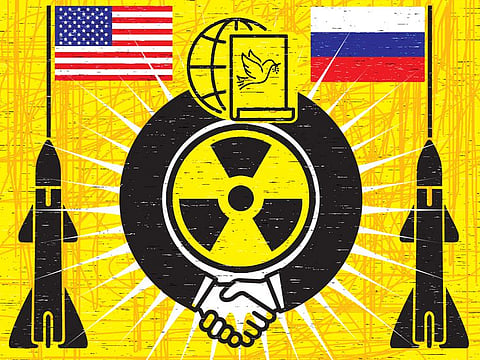Treaty banning nuclear weapons can end nuclear apartheid
World needs to realise dangers of existing and increasing stockpile of nuclear weapons

The UN Treaty on the Prohibition of Nuclear Weapons (TPNW) entered into force on 22 January 2021. At present, 86 member-states have signed the Treaty, and 51 of them have ratified it to be bound by its provisions.
Most of the signatories of the TPNW come from South America, Africa, and Southeast Asia. Despite its shortcomings, in many ways, the Treaty is groundbreaking and will have significant political and moral impact in the global security discourse in the future.
None of the nine declared and assumed nuclear powers — the US, Russia, the UK, France, China, India, Pakistan, North Korea, and Israel — are yet to sign or ratify this critical Treaty.
Moreover, Nato member-states and other powerful and wealthy countries like Japan, South Korea, and Australia have also stayed out of the Treaty as they believe their national security is dependent on US nuclear weapons.
Despite these key countries’ absence from its purview, the TPNW is a significant milestone on the path towards a nuclear-weapon-free world. The end of the Cold War in Europe has reduced the global stockpile of nuclear weapons, but there are still more than 13,400 nuclear warheads.
You only need 100 nuclear weapons to destroy the whole planet. While the US and Russia, who account for more than 90 per cent of world’s nuclear warheads, are spending heavily to modernise and digitalise their nuclear weapons and their delivery systems, China, India, and Pakistan have increased their nuclear arsenals substantially in recent years. World cannot afford another nuclear arms race
The world needs to realise the dangers of the existing and increasing stockpile of nuclear weapons and urgently act to save itself. The TPNW strengthens the provisions of the 1968 Treaty on the Non-Proliferation of Nuclear Weapons and provides a framework for countries worldwide to eliminate nuclear weapons.
It helps to expose an extremely dangerous belief among many countries that the possession of nuclear weapons can provide them security. Moreover, while the world has agreed to ban other highly dangerous weapons like landmines, cluster munitions, and biological and chemical weapons, it had not done that with nuclear weapons.
Catastrophic consequences
More than any other weapon, the humanitarian consequences from nuclear warheads can be the deadliest. The Final Document produced by the 2010 Review Conference of the Parties to the Treaty on the Non-Proliferation of Nuclear Weapons helped bring global attention to the catastrophic humanitarian consequences of nuclear weapons.
Taking the cue, the UN General Assembly adopted a resolution in 2012 and a year later, established a working group to develop a proposal for multilateral negotiations in banning nuclear weapons.
In 2013 and 2014, a series of three international conferences were convened by Norway, Mexico, and Austria to understand the effects of a nuclear weapon detonation. In 2017, after many deliberations, the UN General Assembly convened a Conference to negotiate a legally binding treaty to ban nuclear weapons.
The Conference was in New York from 27 to 31 March and from 15 June to 7 July. On the last day on 7 July 2017, the Conference overwhelmingly voted in favour of the TPNW (122 states voted in favour, one voted against, and one abstained). In the same year, in 2017, the International Campaign to Abolish Nuclear Weapons (ICAN) was also awarded the Nobel Peace Prize.
After receiving the needed 50th instrument of ratification on 24 October 2020, the Treaty as per its article 15(1) came into force on 22 January 2021. The TPNW is comprehensive as it binds its signatories from test or production and prohibits them from threatening to use nuclear weapons.
Creating a global opinion
It also commits its member countries to clean up environments contaminated by nuclear testing and provide assistance to its victims. While creating a global opinion against acquiring nuclear weapons by the aspiring countries, this Treaty gives notice to the established nuclear powers that they have lost the moral right to keep these weapons.
Several countries like Sweden voted in favour of the Treaty in the 2017 Conference but have neither signed nor ratified it. Their arguments for not joining the Treaty are more on technical grounds, as the lack of clarity about the type of nuclear weapons the Treaty covers or how it would relate to other global treaties covering nuclear weapons’ control or proliferation.
However, there is no doubt that the TPNW will help to energise the anti-nuclear weapon domestic groups in these countries to put renewed pressure on their governments to reconsider their positions.
In the era of globalisation of protest movements, the TPNW can act as a catalyst to organise the younger generation of the world in delegitimising nuclear weapons. Civil society pressures have been already built on several state and non-state actors to disassociate themselves from any activities assisting nuclear weapons production.
Several banks, pension funds, and insurance companies, including the Norwegian Pension Fund, the world’s largest sovereign wealth fund, have already stopped financing any companies involved in building nuclear weapons.
With the TPNW, nuclear weapons have not become illegal as some claim. Still, there is no doubt that the Treaty will not only stigmatise the countries that have recently acquired or plan to acquire nuclear weapons by bypassing the nuclear non-proliferation regime but also the possession of nuclear weapons even by the five permanent members (P5) of the UN Security Council.
The TPNW, besides starting a global movement to achieve a nuclear-weapon-free world, has also posed a threat to the P5’s privileged status regarding nuclear weapons, and it might be the beginning of the end of that global Nuclear Apartheid.
Ashok Swain is a Professor of Peace and Conflict Research at Uppsala University, Sweden.







